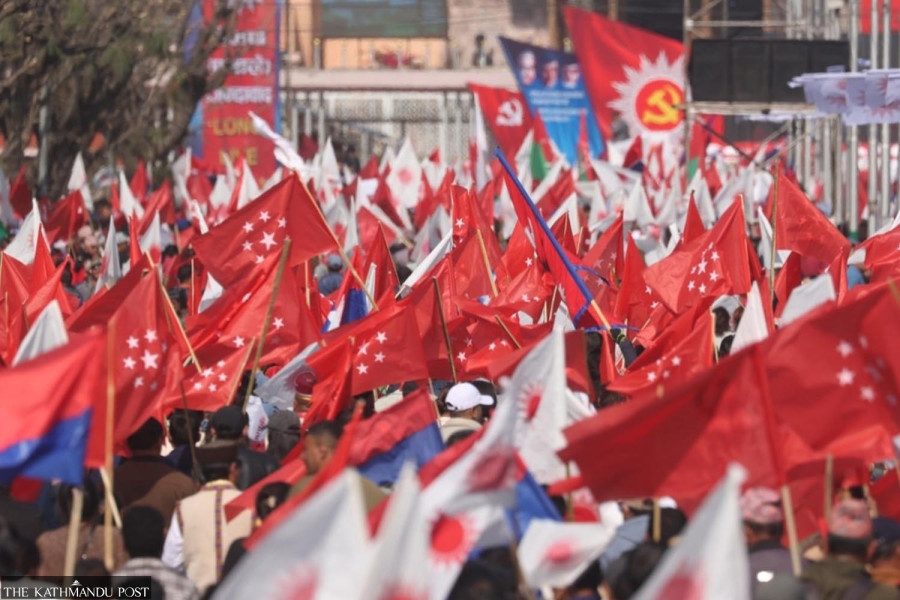Politics
Deliver first, rally later, observers tell ruling CPN-UML
They question the prime minister’s party’s focus on street shows over governance amid growing public frustration.
Purushottam Poudel
The ruling CPN-UML has been staging a series of mass rallies across the country. After a recent show of strength in Butwal, Siraha, and Jhapa, the party has announced a similar event in Kathmandu on April 24. This time, it has been billed as a ‘youth festival’.
Under the banner of the ‘Youth Festival’, the UML aims to flex its organisational muscle by mobilising youth in the national capital.
April 24 marks Loktantra Diwas, the day of the end of King Gyanendra’s direct rule, which lasted about a year and a half and ended with the People’s Movement of 2006. With the former king and his supporters becoming increasingly active in recent months, the UML is organising the ‘festival’ in Kathmandu through its youth wing, tying it with the anniversary of the end of the royal rule.
Kshitiz Thebe, chairperson of the UML-aligned Youth Association Nepal, said the festival would celebrate Loktantra Diwas by honouring the young people. He also claimed that 100,000 youths from across the country will gather in Kathmandu for the event.
But political analysts argue that the UML, as a ruling party, is taking the wrong approach. They believe the party, as a part of the government, should focus on governance—especially at a time when public frustration with politics is on the rise—rather than rally people for street demonstrations.
Currently, people from various professions are protesting in Kathmandu to make their voices heard. From teachers and doctors to cooperative fraud victims, many have taken to the streets. Analysts argue that instead of addressing the pressing issues facing the country, it is inappropriate for a governing party to prioritise displays of strength.
On March 9, pro-monarchy supporters welcomed former King Gyanendra at Tribhuvan International Airport as he travelled from Pokhara to Kathmandu, and escorted him to his private residence. Thousands participated.
Then, a pro-monarchy group advocating the restoration of a Hindu state announced a ‘joint people’s movement’ and held a protest in Kathmandu on March 28. The demonstration turned violent, resulting in the deaths of two individuals and damage to both private and public property.
Monarchist groups have often portrayed public demonstrations as a challenge to the current political system. However, political analysts contend that such displays are more a reflection of the government's failure to deliver results than a rejection of the system itself. In such a scenario, they say, the government and the ruling party must demonstrate greater accountability and responsiveness.
“This is a time when the government’s actions should speak for themselves. If the ruling parties keep talking without delivering, it only adds to public disillusionment,” said Professor of Political Science Krishna Pokharel. “With public frustration mounting, it is absurd for the UML to take to the streets in a show of strength, instead of focusing on meaningful action.”
According to Thebe, the youth festival is expected to be held either at Bhrikutimandap or Tundikhel in Kathmandu. He added that the event will feature discussions on youth-related issues. “The summit will address youth agendas and seek to offer solutions,” said Thebe.
While addressing the UML’s mass gathering in Butwal on April 11, prime minister and party chair, KP Sharma Oli, urged youths to participate in the Kathmandu event. A secretariat meeting of the party held on Monday also decided to make the event meaningful.
“I call upon youths from all over the country to join the youth festival in Kathmandu on April 24,” Oli said. “Let the reactionaries and anarchists see and hear for themselves the power of youth and the strength of UML.”
Oli also clarified that the event is not a seminar or ideological symposium but a “convergence” of youth.
Another political analyst Keshav Dahal, however, said the responsibility of the big ruling parties—the Nepali Congress and the UML—is to govern in a way that assures the public of an active and accountable government, not to put on street spectacles.
According to Dahal, as more people take to the streets to express discontent with politics, this is a moment when the ruling party should be rebuilding public trust through genuine action. “Politics is not a platform for grand displays—it is about working in people’s interest,” he said.
“You strengthen democracy and republic with effective governance. If attention keeps shifting to street-centric activities when real work is needed, public trust is further eroded and the entire political system put at risk,” Dahal added.
Even senior leaders in the ruling Congress have recently begun to question the government's performance. In such a context, many ask why the party in power is more focused on mass gatherings than on governance.
UML’s chief whip Mahesh Bartaula agrees that the government must deliver and that concerns raised should be addressed through action. However, he emphasises that the government and the party are separate entities. While the government will continue to carry out its duties, it is the party that is organising the gatherings. Being in government, he argues, does not mean the party should refrain from such events.
Bartaula also stated that the youth conference is not aimed at any particular group. “Given the recent attempts to undermine the political system itself, the party is organising the youth gathering to raise public awareness and reaffirm support for the system,” he said.




 16.25°C Kathmandu
16.25°C Kathmandu















